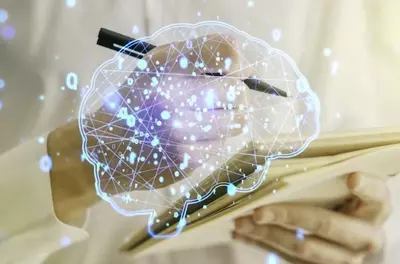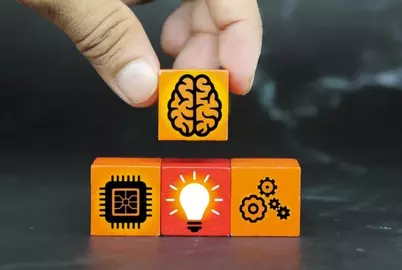Human intelligence has intrigued scientists, researchers, and philosophers for centuries. How did our cognitive abilities evolve, and what factors shaped human intelligence as we know it today? In this blog, we will explore the evolution of cognitive abilities and the role of evolution, environment, genes, and culture in shaping human intelligence. We will also dive into fundamental theories that explain human intelligence.

Additionally, we will examine how cognitive psychology offers insights into human intelligence. Lastly, we will explore ways to enhance cognitive abilities through genetic engineering, child care, educational strategies, nutrition, and chemicals. Join us on this journey to unravel the complexities of human intelligence.
Table of Contents
The Evolution of Cognitive Abilities
The evolution of cognitive abilities has played a crucial role in shaping human intelligence. Early humans developed these cognitive abilities as they faced complex problems and needed to adapt to their environment. This progress allowed them to advance in various areas, such as tool-making, language, and social interaction. Expanding the prefrontal cortex in humans enabled higher-level thinking and decision-making, further enhancing our cognitive abilities.

Human cognitive abilities continue to evolve, shaping our intelligence today. Modern humans possess unique cognitive skills, such as abstract reasoning and creativity. These abilities have been studied extensively through cognitive tests, neuroimaging techniques, and various NLP terms like cognitive functions, brain regions, and neural networks. Research teams have conducted meta-analyses and IQ tests to understand individual differences in cognitive abilities and human intelligence.
Genetic factors also influence cognitive abilities and intelligence. Variance in cognitive development can be attributed to environmental and genetic factors. The evolution of cognitive abilities has profoundly impacted human intelligence. By understanding how cognitive abilities have shaped our minds and the brain structures responsible for cognitive tasks, we gain a deeper appreciation for the complexity of human intelligence.
The Role of Evolution in Human Intelligence
Cognitive abilities have played a crucial role in the evolution of human intelligence. These abilities, including problem-solving, memory, and language, have allowed humans to adapt to their environment, solve complex problems, and develop sophisticated social structures.
The development of these cognitive abilities can be traced back to the evolution of the human brain, which has undergone significant changes over millions of years. Natural selection favored individuals with higher cognitive abilities and better equipped to survive and reproduce in their environments.
A combination of genetic factors and environmental influences, such as social interactions and cultural practices, is believed to influence cognitive ability development. This interplay between nature and nurture has shaped the cognitive landscape of human intelligence throughout evolution.
The Impact of Environment on Cognitive Development
The development of cognitive abilities is a crucial aspect of human intelligence. Cognitive abilities, which encompass learning, thinking, and problem-solving processes, have evolved and are influenced by genetic factors. However, the environment also plays a significant role in shaping cognitive development.

Individuals are exposed to various stimuli and experiences that impact brain development, ultimately influencing their cognitive abilities. Factors such as nutrition, education, social interactions, and cultural practices all contribute to the development of cognitive abilities. Research suggests that early childhood experiences, in particular, significantly impact long-term cognitive development and intelligence.
Understanding the impact of the environment on cognitive development has far-reaching implications. Ensuring access to quality nutrition, education, and social support can maximize the potential for cognitive development.
The Interplay of Genes and Culture on Human Intelligence
Cognitive abilities, such as problem-solving, memory, and language, have played a crucial role in the development of human intelligence. A combination of genetic factors and environmental influences, including cultural practices and social interactions, shapes these cognitive abilities. Genetic variations can contribute to differences in cognitive abilities among individuals and populations, but environmental factors, like access to education and opportunities for intellectual stimulation, also significantly influence cognitive abilities.
The interplay between genes and culture is complex and dynamic, with genetic factors providing a foundation for cognitive potential that is then influenced and shaped by cultural practices and experiences. By understanding this interplay, we gain insights into the factors contributing to individual differences in cognitive abilities and overall human intelligence.
The integration of genetic research and cultural understanding can help us foster environments where all individuals can reach their intellectual potential and contribute to a more inclusive and thriving society.
Fundamental Theories Explaining Human Intelligence
Fundamental theories explaining human intelligence provide valuable insights into the complex nature of cognitive abilities and how they shape our understanding of human intellect. For instance, Emotional Intelligence plays a crucial role in human intelligence, as the emotional intelligence theory proposes. It emphasizes the ability to recognize and manage one’s own emotions and understand and empathize with others.

Additionally, the Flynn Effect is an observed increase in average IQ scores over time, indicating that improvements in nutrition, education, healthcare, and environmental factors have contributed to developing cognitive abilities and higher intelligence levels.
Finally, socio-cultural factors such as education, access to resources, cultural values, and social interactions also significantly influence human intelligence by shaping an individual’s cognitive abilities and intellectual development. Some of the most significant theories which explain human intelligence are as below:
The Theory of Multiple Intelligences
The Theory of Multiple Intelligences, introduced by Howard Gardner, proposes that intelligence is not a singular, unitary ability but a combination of distinct cognitive abilities. Gardner identified eight intelligence types: linguistic, logical-mathematical, spatial, musical, bodily-kinesthetic, interpersonal, intrapersonal, and naturalistic. According to this theory, individuals can excel in one or more of these intelligences while being weaker in others.
The Theory of Multiple Intelligences provides a valuable perspective on human intelligence, highlighting the individual differences and cognitive abilities contributing to our understanding of intelligence. Acknowledging and incorporating this theory into education can create a more inclusive and comprehensive approach to fostering intellectual growth and development.
The Triarchic Theory of Intelligence
The Triarchic Theory of Intelligence, proposed by psychologist Robert Sternberg, suggests that human intelligence comprises three main components: analytical, creative, and practical intelligence.
Analytical intelligence is the ability to analyze and evaluate information, solve problems, and think critically. Creative intelligence involves thinking creatively, generating new ideas, and adapting to new situations. Practical intelligence involves applying knowledge and skills in practical, real-world settings.
The theory highlights the importance of recognizing that intelligence is not solely determined by a single factor, such as IQ, but rather by combining cognitive abilities that shape human intelligence.
Piaget’s Theory
Piaget’s Theory of Cognitive Development suggests that intelligence develops through the interaction between biological maturation and environmental experiences. It proposes that intelligence is not fixed but rather a process of actively constructing knowledge through assimilation and accommodation.
Building upon Piaget’s ideas, contemporary Neo-Piagetian theories assert that cognitive development continues throughout adulthood, with individuals becoming more adept at processing information and solving complex problems. Research teams have studied brain structure, size, and activity to uncover intelligence’s neural correlates. Moreover, they have examined the relationship between intelligence and other factors such as nutrition, personality traits, and emotional intelligence.
Exploring Human Intelligence through the Lens of Cognitive Psychology
Cognitive psychology plays a crucial role in understanding human intelligence. It focuses on how different cognitive abilities shape our intelligence and contribute to various aspects of human cognition. Research has shown that these processes are essential for everyday functioning.

Genetics and the environment are other important factor in cognitive development and intelligence. While genetic factors can influence certain cognitive functions and abilities, the environment also plays a vital role in shaping intelligence. Factors such as nutrition, educational opportunities, and exposure to stimulating environments can all impact cognitive development and, consequently, intelligence.
Exploring human intelligence through the lens of cognitive psychology provides valuable insights into the role of cognitive abilities in shaping intelligence. Understanding the impact of genetics, environment, and the potential for interventions can pave the way for future advancements in enhancing cognitive abilities. By delving deeper into the complex relationship between cognition and intelligence, researchers can continue to uncover the mechanisms underlying human intelligence and ultimately improve the quality of life for individuals worldwide.
How To Enhance Cognitive Abilities
When it comes to enhancing cognitive abilities, several factors come into play. One critical element is genetics’s role in cognitive abilities and intelligence. Research has shown that genetic factors contribute to individual differences in cognitive functioning. However, it is essential to note that genetics is not the sole determinant of cognitive abilities, as environmental factors also play a significant role.

The impact of environmental factors on cognitive development must be considered. Factors such as education, parenting style, and socioeconomic status can all influence cognitive abilities. Providing a stimulating and nurturing environment can help foster the development of cognitive skills.
In addition to genetics and environmental factors, nutrition and physical exercise also play a crucial role in enhancing cognitive abilities. Proper nutrition, including a balanced diet rich in essential nutrients, can support brain health and optimize cognitive functioning. Regular physical exercise has been shown to improve memory, attention, and overall cognitive performance.
Another approach to enhancing cognitive abilities is through mental exercises and brain training games. These activities can help improve memory, attention, and problem-solving skills. They provide targeted stimulation for the brain and can be particularly beneficial for individuals looking to improve specific cognitive functions.
In conclusion, enhancing cognitive abilities is a multifaceted process that involves genetic, environmental, nutritional, and lifestyle factors. By understanding the various components contributing to cognitive functioning, individuals can take a holistic approach to improving their cognitive abilities and overall brain health.
Cognitive Findings and Their Integration with Intelligence Studies
Cognitive findings have played a crucial role in understanding how human intelligence is shaped. Through research, we have learned that cognitive abilities, such as memory, attention, and problem-solving skills, contribute to overall intelligence. A combination of genetic factors and environmental factors influences these abilities.

Studies have shown individual differences in cognitive abilities, with some people naturally having higher levels of cognitive function than others. Various research methods, including intelligence tests and cognitive tasks, measure and assess cognitive abilities. These tests help researchers understand the different aspects of cognition and how they relate to intelligence.
One important finding is that cognitive abilities are not independent of each other but instead are interconnected. For example, people with solid memory skills perform well in attention tasks. This integration of different cognitive abilities contributes to the development of general intelligence, also known as the g factor.
Researchers have used techniques like neural networks and meta-analysis to analyze large amounts of cognitive abilities and intelligence data. These studies have provided strong evidence for the impact of cognitive abilities on human intelligence. They have also helped identify brain regions and cognitive functions associated with intelligence.
Understanding cognitive findings has important implications for our understanding of human intelligence. It highlights the potential for improvement in human cognition and suggests ways to enhance cognitive abilities for better outcomes in various aspects of life. However, it is essential to consider ethical issues and address concerns related to cognitive development and intelligence tests.
Conclusion
Understanding the role of cognitive abilities in shaping human intelligence provides valuable insights into the complexity of our minds. Through years of research and observation, scientists have discovered how various cognitive processes, such as perception, attention, memory, and problem-solving, contribute to our intelligence.
These findings highlight the human brain’s remarkable capacity and the interconnectedness of different cognitive functions. By delving deeper into the study of cognitive abilities, we can better understand ourselves and potentially unlock new ways to enhance our intellectual capabilities. Exploring this fascinating field can open doors to personal growth and development, encouraging us to tap into our full potential.
By continuing to explore and study cognitive abilities, we can further unlock the mysteries of human intelligence and continue to push the boundaries of what we can achieve.
